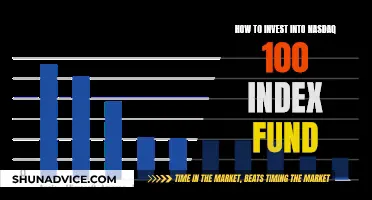
Index funds are a passive investment strategy that aims to mirror the performance of a particular stock market index, such as the S&P 500. They are a low-cost, easy way to build wealth over the long term and are popular with retirement investors. Index funds are available across a variety of asset classes, including stocks, bonds, and commodities, and can be purchased through a brokerage account, an individual retirement account (IRA), or a 401(k). When investing in index funds outside the US, individuals can gain exposure to international stocks and specific sectors or countries.
What You'll Learn

Index funds are a low-cost, passive investment strategy
Low Costs and Passive Management
Index funds are a type of mutual or exchange-traded fund (ETF) that tracks the performance of a market index, such as the S&P 500, by holding the same stocks or bonds or a representative sample of them. They are considered a passive investment strategy because they don't actively pick securities or time the market. Instead, they aim to mirror the performance of a specific index, which results in lower costs for investors. The fees for index funds are typically lower than those of actively managed funds because there is less research, trading, and transaction costs involved. This passive management strategy also means that index funds are less complex and can be a more straightforward way to invest.
Broad Diversification
Index funds provide broad market exposure and diversification across various sectors and asset classes. By investing in an index fund, you benefit from the positive effects of diversification. Even if an individual stock within the index performs poorly, it is likely a small part of the overall index, so the impact on your investment is minimised. This diversification also helps to lower the overall risk of your investment.
Long-Term Performance
Index funds are designed for long-term investing. While they may lack the flexibility to pivot during market shifts, they have consistently outperformed actively managed funds over the long term. Historical data shows that index funds have often provided attractive returns during bull markets, and their passive management strategy has resulted in solid long-term returns.
Tax Efficiency
The buy-and-hold strategy employed by index funds results in lower taxable capital gains distributions. This makes index funds more tax-efficient than actively managed funds, which trade more frequently and trigger higher capital gains taxes.
Simplicity and Transparency
Index funds are simple to invest in and provide transparency into their holdings. You can easily research and understand the performance history, management fees, and indexes tracked by various index funds. This makes it easier to diversify your portfolio and align your investments with your financial goals.
In summary, index funds offer a low-cost, passive investment strategy that provides broad market exposure, diversification, long-term performance, and tax efficiency. They are a popular choice for investors seeking a straightforward, well-diversified investment option that can provide solid returns over time.
Best SBI Mutual Fund Schemes for Investors
You may want to see also

S&P 500 index funds are a popular choice for long-term investing
Index funds are a passive investment strategy that allows investors to mirror the performance of a particular stock market index, such as the S&P 500. S&P 500 index funds are a popular choice for long-term investing due to their low costs, diversification benefits, and historical performance.
Low Costs
Index funds are passively managed, meaning they aim to replicate the performance of a specific index without actively selecting investments. As a result, they have lower expense ratios than actively managed funds, which may charge higher fees for investment management services. S&P 500 index funds, in particular, offer some of the lowest costs among index funds. For example, the Fidelity ZERO Large Cap Index fund (FNILX) has an expense ratio of 0%, while the Vanguard S&P 500 ETF (VOO) has an expense ratio of 0.03%.
Diversification
S&P 500 index funds provide investors with immediate diversification by allowing them to own a portion of 500 large US companies across various sectors. This diversification reduces the risk associated with investing in individual stocks, as the performance of the fund is not dependent on the success of a single company.
Historical Performance
Historically, the S&P 500 index has delivered solid returns over the long term, with an average annual return of about 9% to 10%. While there have been periods of decline, such as during the Great Recession, the index has a strong track record of rebounding and delivering profits over long holding periods.
Other Considerations
When choosing a specific S&P 500 index fund, investors should consider factors such as the fund's expense ratio, investment minimum, dividend yield, and inception date. It's important to compare fees and investment requirements across different funds, as these can vary even among funds tracking the same index. Additionally, investors should be cautious of leveraged S&P 500 index funds, as these products are designed for short-term trading and carry higher risks over the long term.
In summary, S&P 500 index funds offer a simple, low-cost, and diversified investment strategy that has delivered solid returns over time, making them a popular choice for long-term investors.
Mutual Funds: Smart Strategies for Successful Investing
You may want to see also

Index funds are available as both mutual funds and ETFs
Index funds are available as both mutual funds and exchange-traded funds (ETFs). Both are passively managed and aim to replicate the performance of a specific market index, such as the S&P 500 for large US stocks or the Bloomberg US Aggregate Bond Index for bonds. They are popular due to their simplicity, low costs, and good performance.
Mutual funds are priced once daily after the market closes, and investors buy or sell shares directly from the fund company. They are only priced at the end of the day, and there are no shareholder transaction costs. Actively managed mutual funds tend to have higher fees and expense ratios due to their higher operations and trading costs.
ETFs, on the other hand, are traded on stock exchanges like stocks and can be bought and sold throughout the trading day. They are more flexible and accessible, with no minimum investment requirement, making them more suitable for retail investors. ETFs also tend to be more tax-efficient than mutual funds due to their structure, which minimizes capital gains distributions.
Both mutual funds and ETFs provide investors with broad, diversified exposure to the stock market, making them good long-term investment options. The choice between the two depends on various factors such as management fees, transaction costs, taxation, and investment goals.
Dave Ramsey's Investment Strategy: Specific Fund Choices
You may want to see also

Index funds are a great option for beginner investors
Index funds are passively managed, meaning they don't require a team of analysts and portfolio managers to try to beat the market. As a result, they have lower expense ratios than most actively managed funds, and they often outperform them too.
Index funds are also a good option for beginners because they require minimal investment research. The fund's portfolio manager is responsible for simply matching the underlying index's performance over time. This makes it easier for beginners to get started with investing and build their wealth over the long term.
Additionally, index funds are tax-efficient compared to many other investments. They generally don't trade as frequently as actively managed funds, so they generate fewer capital gains that can increase your tax bill.
Overall, index funds offer a simple, low-cost way to invest in a diversified portfolio of stocks or bonds, making them a great option for beginner investors.
Large-Cap Funds: When to Invest for Maximum Returns
You may want to see also

Index funds are a good way to diversify your portfolio
Index funds are a great way to diversify your portfolio. They are a low-cost, easy way to build wealth and are a good investment for building wealth over the long term. They are also less expensive than actively managed funds and typically carry less risk than individual stocks.
Index funds are a group of stocks that mirror the performance of an existing stock market index, such as the Standard & Poor's 500 index. An index fund will be made up of the same investments that make up the index it tracks, so the performance of the index fund usually closely mirrors that of the index, without the need for hands-on management.
Index funds are considered a passive management strategy because they don't need to actively decide which investments to buy or sell. They are often used to help balance the risk in an investor's portfolio, as market swings tend to be less volatile across an index compared to individual stocks.
Index funds are available across a variety of asset classes, allowing investors to buy funds that focus on companies with small, medium, or large capital values, or on specific sectors like technology or energy.
- Minimal investment research: You can rely on the index fund's portfolio manager to simply match the underlying index's performance over time.
- Managed investment risk: Diversification leaves you less likely to suffer big losses if something bad happens to one or two companies in the index.
- Lots of choices: You can buy broad index funds, such as those that track the S&P 500, or more focused index funds that invest in specific sectors or trends.
- Low fees: Index funds are usually far less costly than alternatives like actively managed funds because an index fund manager just has to passively buy the stocks or other investments in an index.
- Tax efficiency: Index funds are quite tax-efficient compared to many other investments because they generally don't have to do as much buying and selling of their holdings, so they avoid generating capital gains that can add to your tax bill.
Municipal Bond Funds: When to Invest for Maximum Returns
You may want to see also
Frequently asked questions
Index funds are a low-cost, easy way to build wealth. They are less expensive than actively managed funds and typically carry less risk than individual stocks. Index funds are also a great investment for building wealth over the long term, which is why they are popular with retirement investors.
When choosing an index fund, consider the following:
- Expense ratio: As index funds are passively managed, the fees you pay for fund upkeep should be nominal.
- Minimum investment: Index funds have different investment minimums for taxable investment accounts and IRAs.
- Dividend yield: Compare the dividend yield between index funds as dividends could boost returns, even in down markets.
- Inception date: If you prefer a fund with a solid track record, consider its inception date.
You can start investing in index funds by opening a brokerage account, such as a taxable brokerage account, an individual retirement account (IRA), or a robo-advisor platform. You can then buy shares of the index fund that interests you.
Note: This answer assumes that the user is based outside the US.







